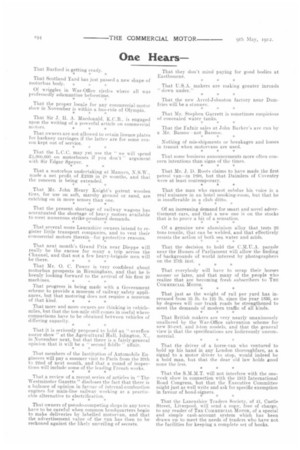One Hears
Page 8

If you've noticed an error in this article please click here to report it so we can fix it.
That Burford is getting ready.
That Scotland Yard has just passed a new shape of motorbus body. * * * Of wriggles in War-Office circles where all was professedly adamantine beforetime.
That the proper locale for any eommereial-motor show in November is within a bus-ride of Olympia_ That Sir J. H. A. Macdonald, K.C.B., is engaged upon the writing of a powerful article on commercial motors.
That owners are not allowed to retain licence plates for hackney carriages if the latter are for some reason kept out of service.
That the L.C.C. may yet use the " we will spend £1,000,000 on motorbuses if you don't" argument with Sir Edgar Speyer.
That a motorbus undertaking at Manaro, N.S.W., made a net profit of £2339 in 28 months, and that the concern is being extended.
That Mr. John Henry Knight's patent wooden tires, for use on soft, marshy ground or sand, are catching on in more senses than one.
That the present shortage of railway wagons has accentuated the shortage of heavy motors available to meet numerous strike-produced' demands.
That several more Lancashire owners intend to register little transport companies, and to vest their commercial motors therein—for protective reasons.
That next month's Grand Prix near Dieppe will really be the excuse for many a trip across the Channel, and that not, a few heavy-brigade men will be there.
That Mr. 0. C. Power is very confident about motorbus prospects in Birmingham, and that he is keenly looking forward to the arrival of his first 20 machines.
That progress is being made with a Government scheme to provide a museum of railway safety appliances, but that motoring does not. require a museum of that kind.
That more and more owners are thinking in vehiclemiles, but that the ton-mile still comes in useful where comparisons have to be obtained between vehicles of differing capacity.
That it is seriously proposed to hold an " overflow motor show " at the Agricultural Hall, Islington, N., in November next, but that there is a fairly-general opinion that it will be a " second fiddle " affair.
That. members of the Institution of Automobile Engineers will pay a summer visit to Paris from the 20th to 22nd of next month, and that a round of inspections will include some of the leading French works.
That a review of a recent series of articles in "The Westminster Gazette " discloses the fact that there is a balance of opinion in favour of internal-combustion engines for main-line railway working as a practicable alternative to electrification.
That owners of pseudo-competing shops in any town have to be careful when common headquarters begin to make deliveries by labelled motorvan, and that the advertisement value of the van has then to be reckoned against the likely unveiling of secrets. That they don't mind paying for good bodies at Eastbourne.
That U.S.A. makers are making greater inroads "down under."
That the new Arrol-Johnston factory near Dumfries will be a stunner.
That Mr. Stephen Garrett is sometimes suspicious of concealed water tanks.
That the Fafnir sales at John Barker's are run by a Mr_ Basson --not Bassom.
Nothing of mis-shipments or breakages and losses in transit when motorvans are used.
That some business announcements more often concern intentions than signs of the times.
That Mr. J. D. Roots claims to have made the first petrol van—in 1898, but that. Daimlers of Coventry were at least. contemporary.
That the man who cannot subdue his voice is a real nuisance in an hotel smoking-room, but that he is insufferable in a club ditto.
Of an increasing demand for smart and novel advertisement cars, and that. a new one is on the stocks that is to prove a bit of a sensation.
Of a genuine new aluminium alloy that tests 26. tons tensile, that can be welded, and that effectively resists the action of both sea water and acids.
That the decision to hold the C.M.U.A. parade near the Houses of Parliament will allow the finding of backgrounds of world interest by photographers on the 27th inst.
That everybody will have to scrap their horses sooner or later, and that many of the people who realize that are becoming fresh subscribers to THE COMMERCIAL MOTOR.
That just as the weight. of rail per yard has increased from 35 lb. to 125 lb. since the year 1830, so by degrees will our trunk roads be strengthened to meet the demands of modern traffic of all kinds.
That British makers are very nearly unanimously unallu red by the War-Office subvention scheme for new 30-cwt. and 3-ton models, and that the general view is that the specifications are ludicrously uncommercial.
That the driver of a horse-van who ventured to hold up his hand in any London thoroughfare, as a signal to a motor driver to stop, would indeed be a bold man, but that. the dear old law holds good none the less.
That the S.M.M.T. will not interfere with the oneweek show in connection with the 1913 International Road Congress, but that the Executive Committee might just as well write and ask for specific exemption in favour of bond-signers.
That. the Lancashire Traders Society, of 41, Castle Street, Liverpool, will send a copy, free of charge, to any reader of THE COMMERCIAL MOTOR, of a special and simple cash-account system which has been drawn up to meet the needs of traders who have not the facilities for keeping a complete set of books.
























